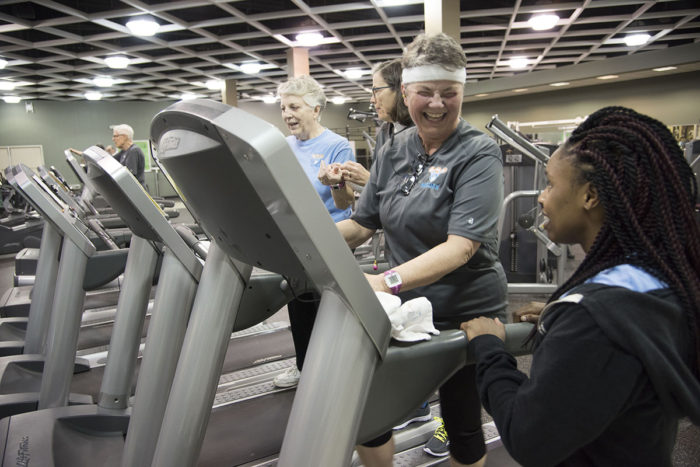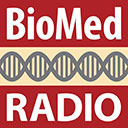Exercise, mindfulness, drug therapy tested in older adults
Goals of research are to improve thinking, find better ways to relieve depression
 Robert Boston
Robert BostonWashington University researchers are looking for new ways to treat depression and cognitive decline in older adults, employing new combinations of drugs, exercise and mindfulness training in a pair of studies. Here, exercise trainers Jaquelle Spencer (far right) and Mary Ulrich (center, wearing glasses) work with study patients Dorothy Downs (in blue) and Geraldine Ford (in gray) at the BJC WellAware Center.

Researchers at Washington University School of Medicine in St. Louis are seeking volunteers for two studies evaluating approaches for treating depression and preserving cognitive function in older adults.
One study focuses on the effects of exercise and mindfulness training for older adults with depression or anxiety. The other will test antidepressant medications to determine which are best for older adults with depression.
Both studies also are using imaging techniques to measure brain health and aging. The studies are run by the university’s Healthy Mind Laboratory.
In the first study, the researchers are testing exercise and mindfulness training in healthy adults ages 65 and older. A preliminary study involving patients at Washington University and the University of California, San Diego, reported that mindfulness training improved cognitive performance in older adults. Now, the researchers are evaluating the effects of exercise, too. As part of the study, they will scan participants’ brains, using functional imaging technology.
“Using new brain-imaging techniques, we can measure how efficiently the brain is working,” said senior investigator Eric J. Lenze, MD, a professor of psychiatry. “We believe the scans may answer questions about how mindfulness training, exercise and other approaches might keep our brains young even as we get old.”
Volunteers in the study, called MEDEX (Mindfulness, EDucation and EXercise), will be randomly assigned to one of four treatment groups: The first set of patients will receive eight weeks of health education; the second group will participate in an exercise program for eight weeks; another group will learn stress-reduction techniques, such as deep breathing, meditation and yoga; and the fourth group will participate in a combination of mindfulness and exercise training. Each group will participate in its respective activity for eight weeks.
Following that period, researchers will check in with participants every month for a year and a half to see whether they’ve continued their activities and to check on their mental states.
“Once they’ve learned how to practice mindfulness or exercise, we want volunteers to maintain the practice so we can see whether its benefits grow over time,” said Lenze, director of the Healthy Mind Laboratory.
The second study is aimed at older adults with depression who haven’t responded to therapy. Called OPTIMUM (Optimizing Depression Treatment in Older Adults), this study tests older and newer antidepressant drugs as treatments for depression.
“It’s pretty clear that treatment-resistant depression harms the brains of older adults,” Lenze said. “We’re studying the relationship between depression and cognitive decline, and using brain imaging to try to understand how depression may accelerate those declines, and whether treatment slows it down.”
Nearly one-third of the 14 million Americans who live with clinical depression don’t get relief from standard therapies. To try to change those numbers, all participants in the OPTIMUM study receive 10 weeks of drug therapy, using a combination treatment or a switch to a medication they haven’t already tried. They also receive brain scans to evaluate brain function before and after treatment.
The antidepressants being tested are all widely available as inexpensive generic medications and include older medications that were prescribed more commonly a decade or two ago: nortriptyline or lithium. All study participants receive additional care from the researchers in the form of frequent telephone check-ins, to maximize the odds that a patient will benefit. The goal is to find the most effective drugs to treat depression in individual patients.
“It’s not one-size-fits-all therapy,” Lenze said. “Different patients respond to different drugs in different ways. We believe tailoring therapy to individuals will more effectively help people feel better and help their brains work better.”
The researchers are recruiting older adults with depression at five sites nationwide. In addition to Washington University, the OPTIMUM study is underway at UCLA, the University of Pittsburgh, the University of Toronto and Columbia University in New York.
For more information on the MEDEX study, call 314-747-1134 or or e-mail HealthyMind@psychiatry.wustl.edu. For the OPTIMUM study, call 314-273-7034 or e-mail OPTIMUM@wustl.edu.






